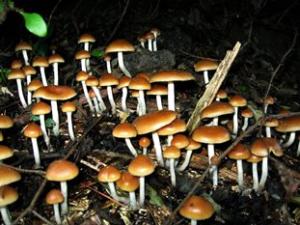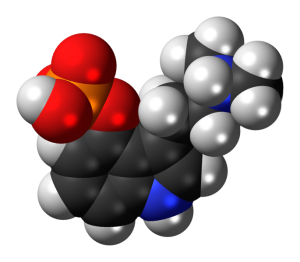Please make a generous donation, to help us meet the crises and the opportunities today in drug policy.
The world's largest psychedelic research center is getting ready to open in Baltimore.
The DEA has come out with proposed quotas for marijuana and prescription opioids for 2020, a Florida legalization initiative has already raised a million dollars, and more.
A drug decriminalization initiative could make its way to Oregon's 2020 ballot, South Dakota's Republican governor vows to veto any hemp bill again next year, a California marijuana banking bill is dead for the year, and more.
An Oregon initiative to allow the therapeutic use of magic mushrooms is set to begin signature gathering, an Arizona initiative to legalize marijuana is going to get some minor tweaks, and more.
A broad coalition of civil rights and other groups are calling for marijuana legalization and more, Mississippi activists hand in signatures for a medical marijuana initiative, a possible culprit for that spate of pulmonary illnesses linking to marijuana vaping has been found, and more.
Johns Hopkins University will open a new center on psychedelic research, hemp cultivation in the US quadruples over last year, Guatemala declares a state of seige after suspected drug traffickers killed three soldiers, and more.
Dear friend,
| |  |
| | David Borden |
As I've written recently, this is a good time and a bad time in drug policy reform. Marijuana reform continues to have 2019 momentum. Presidential candidates are debating criminal justice and drug policy more than ever. But politicians are still ready to file new and bad sentencing bills – so quickly forgetting lessons they claim to have learned – and international human rights in the drug war are in a full blown crisis.
We need your help to stay on the move at this important time. Can you make a donation today to help? Visit https://stopthedrugwar.org/donate, and click on the tax-deductible donation link or the non-deductible donation link, whichever kind you wish to make. Our donation form accepts credit card, PayPal, and bank ACH.
We especially need help with non-deductible donations to our 501(c)(4) nonprofit. Because our newsletter reports on political candidates, we cover the substantial cost of our web site server and email list service fully with non-deductible funds. This is to protect our tax-deductible 501(c)(3) nonprofit, which can't afford to be implicated, rightly or wrongly, in candidate advocacy. Most of our current funding is of the tax-deductible kind, especially the larger grants and gifts.Can you make a non-deductible donation to sustain our newsletter through the campaign season? Visit our candidates archive page here.
All that said, a tax-deductible donation for our urgent campaign to stop Duterte's extrajudicial drug war killings in the Philippines, or for our work at the United Nations, would make a big difference too, and we would be equally grateful. Visit https://stopthedrugwar.org/philippines and https://stopthedrugwar.org/global to learn more about our work in those areas.
Our web site supports both one-time donations and recurring ones, on cycles including monthly, quarterly, annually, and other options. Donations can also be sent by mail. For a non-deductible donation, make your check payable to Drug Reform Coordination Network, and send to P.O. Box 9853, Washington, DC 20016. Tax-deductible donation checks should be payable to DRCNet Foundation, same address.
Visit https://stopthedrugwar.org/about#donations for information on other donation options like stock shares, or to read more about our work. Thank you for your support, and enjoy the rest of your summer.
Sincerely,

David Borden
StoptheDrugWar.org
Washington, DC
"US and UN Drug Policy Reform"
https://stopthedrugwar.org
back to top
The accelerating field of psychedelic research just got turbocharged. Thanks to a group of private donors, one of the nation's premier universities is moving forward with plans for what's believed to be the first such research center in the country and the largest of its kind in the world.

psilocybin-containing magic mushrooms (Greenoid/Flickr)
Johns Hopkins University in Baltimore will use $17 million in initial funding to create the Center for Psychedelic and Consciousness Research,
the university announced last week. The center will focus on the impact of psychedelics on behavior, brain biology and function, learning and memory, and mood.
The move comes as renewed scientific interest in the therapeutic uses of psychedelics has mushroomed in recent years, led to a large degree by Johns Hopkins researchers, who have been at the forefront of psychedelic research in the 21st century.
In 2000, Johns Hopkins researchers made a breakthrough, becoming the first in the country to win regulatory approval to restart research on psychedelics in healthy people who had never used such drugs. That resulted in a 2006 publication on the safety and long-lasting positive effects of a single dose of psilocybin, which jumpstarted a renaissance of psychedelic research worldwide.
Researchers linked to the university have published studies on psychedelics in more than 60 peer-reviewed journals, finding therapeutic benefits for people suffering from conditions ranging from nicotine addiction to depression and anxiety associated with terminal diseases.
Those studies helped pave the way for contemporary studies on the treatment of depression. Other Johns Hopkins research has resulted in safety guidelines for psychedelic research that have helped researchers at other universities around the world win approval for studies, while yet more research has dealt with the thorny problem of measuring how psychedelics affect mystical, emotional, and meditative experiences.
And now, get ready for much, much more. The new center will provide support a half-dozen neuroscientists, experimental psychologists, and clinicians, as well as five post-doctoral scientists -- all with expertise in psychedelic studies. Most of the research is going to center on psilocybin, the psychoactive compound in magic mushrooms.
"The center's establishment reflects a new era of research in therapeutics and the mind through studying this unique and remarkable class of pharmacological compounds," said Roland Griffiths, the center's director and professor of behavioral biology in the Department of Psychiatry and Behavioral Sciences and the Department of Neuroscience at the Johns Hopkins University School of Medicine. "In addition to studies on new therapeutics, we plan to investigate creativity and well-being in healthy volunteers that we hope will open up new ways to support human thriving."
"I am thrilled about this magnificent opportunity that has been provided by enlightened private funders," said James Potash, a professor and director of the Department of Psychiatry and Behavioral Sciences. "This center will allow our enormously talented faculty to focus extensively on psychedelic research, where their passions lie and where promising new horizons beckon."
Because there is no federal funding for such research, private funders have been lined up to cover the first five years of the center's operating expenses. Those funders are the Steven & Alexandra Cohen Foundation and four philanthropists: Tim Ferriss, author and technology investor; Matt Mullenweg, co-founder of WordPress; Blake Mycoskie, founder of the shoe and accessory brand TOMS; and investor Craig Nerenberg.
"We have to take braver and bolder steps if we want to help those suffering from chronic illness, addiction, and mental health challenges," said Alexandra Cohen. "By investing in the Johns Hopkins center, we are investing in the hope that researchers will keep proving the benefits of psychedelics -- and people will have new ways to heal."
The center's faculty will train graduate and medical students who want to pursue careers in psychedelic science, where there have historically been few avenues for career advancement.
"This represents the largest investment to date in psychedelic research, as well as in training the next generation of psychedelic researchers," said Ferriss. "I sincerely hope this ambitious Johns Hopkins center will inspire others to think big and establish more psychedelic research centers in the US and overseas, as there's never been a better time to support such important work."
And a new era dawns.
back to top
The DEA has come out with proposed quotas for marijuana and prescription opioids for 2020, a Florida legalization initiative has already raised a million dollars, and more.

key-west.jpg
DEA Wants 3.2 Million Grams of Marijuana Legally Grown In 2020. The DEA has set a quota of 3.2 million grams of marijuana to be grown legally for scientific research purposes next year. That's a bit more than 7,000 pounds, and it's up more than 30% over this year's quota of 2.45 million grams. "This will meet the need created by the increase in the amount of approved research involving marijuana," DEA said in a press release. "Over the last two years, the total number of individuals registered by DEA to conduct research with marijuana, marijuana extracts, derivatives and delta-9-tetrahydrocannabinol (THC) has increased by more than 40 percent, from 384 in January 2017 to 542 in January 2019."
Florida Legalization Campaign Has Raised $1 Million. Make It Legal Florida (MILF), the group behind the Adult Use of Marijuana initiative, has already raised more than $1.09 million for its effort to put the measure on the 2020 ballot, almost entirely from two major players in the legal marijuana industry, Surterra Wellness and MadMen, Inc. The information comes from campaign finance filings on September 1. Another group, Sensible Florida, is sponsoring a competing marijuana legalization initiative. It has raised $177,883 and received $245,725 in in-kind contributions.
Heroin and Prescription Opioids
DEA Proposes Reductions in Opioid Manufacturing for 2020. The DEA is proposing to reduce the amount of five Schedule II opioid controlled substances that can be manufactured in the United States next year compared with 2019. The agency proposes to reduce the amount of fentanyl produced by 31%, hydrocodone by 19%, hydromorphone by 25%, oxycodone by 9%, and oxymorphone by 55%. Combined with morphine, the proposed quota would be a 53% decrease in the amount of allowable production of these opioids since 2016.
International
Australian Government Proposes Drug Testing for Welfare Benefits. The Liberal government of Prime Minister Scott Morrison has filed a bill in parliament to drug test welfare recipients. The legislation, which would run trial programs in several districts -- all controlled by the Labor party -- would restrict benefits to a debit card following the first positive, and require participation in a drug treatment program following the second. It has been criticized by health experts and drug policy reformers for stigmatizing welfare recipients while diverting from addressing the root causes of addiction. Morrison told the Australian Broadcasting Corporation, "This is a trial. We are trying to work out if this can work. I am really puzzled by the level of opposition to the government trying to tackle a problem of drug addiction for people who are not in work and helping them get over it with referral to proper services and funding those services in those trial areas."
back to top
A drug decriminalization initiative could make its way to Oregon's 2020 ballot, South Dakota's Republican governor vows to veto any hemp bill again next year, a California marijuana banking bill is dead for the year, and more.

Drug decriminalization would result in many fewer scenes like this. (Creative Commons)
California Marijuana Banking Bill Won't Happen This Year. A bill that would have let the state charter special banks to deal with the marijuana industry is going nowhere this year, its sponsor said Monday. Sen. Bob Hertzberg (D) said there will be no vote this year and that if California is going to do this, "we have to do this right."
Baltimore City Councilwoman Introduces Ordinance Banning Marijuana Testing for Some City Job Applicants. City Councilwoman Shannon Sneed (D) filed an ordinance Monday under which applicants for many jobs with the city of Baltimore would not face pre-employment drug screening for marijuana. She said positive marijuana tests could keep otherwise qualified applicants from jobs "due to private recreational activities." Applicants for jobs with the health department, fire department or positions requiring certain security clearances or a commercial driver's license would not be included in the ban and could still be tested. The ordinance is cosponsored by five of the city's 14 other councilmembers.
Hemp
South Dakota Governor Promises to Veto Hemp Again Next Year. Gov. Kristi Noem (R), who vetoed a bill legalizing hemp farming earlier this year, is now vowing to veto such legislation again if it resurfaces next year. She said she would continue to oppose hemp legalization until law enforcement can tell the difference between hemp and marijuana. "Every experiment needs a control," she wrote on Monday. "I believe the social experiment our nation is conducting with highly potent legal weed will end poorly. But to create evidence for a comparison, we need leaders willing to stand up and say, 'No.'"
Drug Policy
Oregon Drug Decriminalization Initiative Filed. Oregon reformers have filed an initiative to decriminalize the personal possession of all drugs with an eye on the November 2020 ballot. The measure, the Drug Addiction Treatment and Recovery Act (Initiative 44), would make the possession of small amounts of drugs, including cocaine, heroin and methamphetamine, a civil violation punishable by a maximum $100 fine and no jail time. There would be an option to avoid the fine by completing a health assessment through an addiction recovery center. That process would involve a substance use disorder screening from a licensed health professional.
back to top
An Oregon initiative to allow the therapeutic use of magic mushrooms is set to begin signature gathering, an Arizona initiative to legalize marijuana is going to get some minor tweaks, and more.

These psilocybin mushrooms could become available for therapeutic purposes if an Oregon initiative passes. (Creative Commons)
. The organizers of the
Smart and Safe Arizona Act are moving to make "minor" changes to their proposed initiative after changes were recommended by the Legislative Council. Most of the changes are stylistic or grammatical to make the measure consistent with how bills are drafted in the legislature, but one gap identified -- where funds from civil penalties and fines for violations of the act will go -- will be addressed. Backed by medical marijuana operators in the state, the initiative would legalize the personal possession of up to an ounce of pot but would limit retail sites mainly to existing medical marijuana dispensary locations. Retail sales would be taxed at 16%, with most revenues directed toward community colleges and public safety.
Psychedelics
Oregon Psilocybin Initiative Certified for Signature Gathering. Oregon officials certified the ballot title for the Psilocybin Service Initiative, or Initiative Petition #34, last Friday, opening the way for signature gathering to begin. The measure does not generally decriminalize magic mushrooms and their psychoactive ingredient, but instead would allow "manufacture, delivery, administration of psilocybin at supervised, licensed facilities." Backers of the initiative have until July 2, 2020, to get 112,020 valid voter signatures to get the measure on the November 2020 ballot.
Criminal Justice
Kamala Harris Rolls Out Criminal Justice Platform. California senator and Democratic presidential contender Kamala Harris on Monday unveiled a proposal for sweeping reforms in the criminal justice system to end mass incarceration, help felons reintegrate into society, and increase oversight of police and prosecutors. She called for marijuana legalization, the end of the death penalty for federal crimes, the end of mandatory minimum sentencing, scrapping the cash bail system, and ending the use of private prisons, among other planks. Rivals for the Democratic nomination, including Sens. Elizabeth Warren, Bernie Sanders and Cory Booker, have released similar plans.
(This article was prepared by StoptheDrugWar.org's 501(c)(4) lobbying nonprofit, the Drug Reform Coordination Network, which also pays the cost of maintaining this website. DRCNet Foundation takes no positions on candidates for public office, in compliance with section 501(c)(3) of the Internal Revenue Code and does not pay for reporting that could be interpreted or misinterpreted as doing so.)
back to top
A broad coalition of civil rights and other groups are calling for marijuana legalization and more, Mississippi activists hand in signatures for a medical marijuana initiative, a possible culprit for that spate of pulmonary illnesses linking to marijuana vaping has been found, and more.

A medical marijuana dispensary. Will we be seeing them soon in Mississippi? (Sonya Yruel/DPA)
Civil Rights Groups Call for Marijuana Legalization, "Dismantling" of Drug Criminalization. More than a hundred civil rights and other groups, including the ACLU, NAACP, National Education Association, and National Organization for Women called Thursday for marijuana legalization and the "dismantling" of drug criminalization. The groups said states should "legalize marijuana through a racial justice framework that focuses on access, equity, and repairing the damage of prohibition" and the federal government should end cannabis prohibition and "implement marijuana reform through a racial justice lens."
Vitamin E Suspected in Serious Lung Problems Among People Who Vaped Marijuana. As the number of people falling ill continues to rise, New York state health officials said Thursday they are zeroing in on an additive -- Vitamin E acetate -- they believe may be behind the outbreak of severe pulmonary illness that has left at least three dead so far, one each in Indiana, Illinois, and Oregon. The officials said high levels of Vitamin E acetate were found in many of the cartridges of marijuana vaping products used by people who suffered serious lung damage. The officials said the products appeared to be black market products.
Medical Marijuana
Mississippi Medical Marijuana Initiative Campaign Turns in Lots of Signatures. Mississippians for Compassionate Care delivered more than 105,000 raw voter signatures to state officials Wednesday. Another 105,000 voter signatures have already been certified by local clerks. The group only needs 86,000 valid voter signatures to qualify for the November 2020 ballot.
Heroin and Prescription Opioids
New York Prisoners Sue State Over Crackdown on Pain Pills. A group of state inmates is suing the prison system, saying they are being forced to live with chronic pain because some medications have become too difficult to get behind bars after the prison system tried to crack down on prescription opioid abuse. The lawsuit was filed Monday in federal court. They are taking aim at 2017 policy that requires an extra layer of approval by senior prison medical staff before inmates can get prescriptions filled for commonly abused drugs. The lawsuit says that, in reality, that approval is rarely given and that hundreds of prisoners are being cut off from drugs needed for legitimate medical reasons.
Asset Forfeiture
Federal Drug Asset Seizures Slashed by Half Since 2009. Drug-related federal asset forfeitures have declined by 34% since 2014 and by more than half since 2009, according to a new report from the Transactional Records Access Clearinghouse (TRAC) at Syracuse University. In 2009, there were some 1,426 federal drug-related asset seizures, but so far this year there have only been 513. "Under the current administration, the numbers have risen modestly, but are still far below earlier levels," TRAC reported.
back to top
Johns Hopkins University is opening a psychedelic research center, hemp cultivation in the US quadruples over last year, Guatemala declares a state of seige after suspected drug traffickers killed three soldiers, and more.

The psilocybin molecule. They'll be taking a look at the new Johns Hopkins psychedelic studies center. (Creative Commons)
Hemp Farming Quadrupled in Tte US This Year, New Report Shows. In a report released Thursday, the advocacy group Vote Hemp announced that the amount of land devoted to legal hemp cultivation in the country has more than quadrupled this year. Since passage of the farm bill last year federally legalized hemp production, the amount of land licensed for cultivation -- primarily female plants for CBD production -- was 511,442 acres, up from 78,000 acres grown last year and less than 10,000 acres cultivated in 2016.
Law Enforcement
St. Louis Cop Kills Armed Man in Small-Time Marijuana Bust. Early Thursday morning, a St. Louis police officer shot and killed a man he was trying to arrest in a small-time marijuana bust after the man allegedly tried to pull a gun from his pocket. Officers were patrolling an area "known for drug activity" when they noticed several people around a parked car. Approaching the vehicle, they found a man with marijuana on his lap. Police said he refused their commands to exit the vehicle, so they pulled him from the car and one of the officers "notice[d] there [was] a gun that the person [wa]s trying to remove from his pocket" and then shot him. The victim, described as a 28-year-old black man, has not yet been identified.
Psychedelics
Johns Hopkins Launches Center for Psychedelic Research. A group of private donors has given $17 million to start the Center for Psychedelic and Consciousness Research at Johns Hopkins Medicine, making it what's believed to be the first such research center in the US and the largest research center of its kind in the world. The Center for Psychedelic and Consciousness Research will focus on how psychedelics affect behavior, brain function, learning and memory, the brain's biology, and mood. At Johns Hopkins, much of the early work with psychedelics has focused on psilocybin, the chemical found in so-called magic mushrooms. Further studies will determine the chemical's effectiveness as a new therapy for opioid addiction, Alzheimer's disease, post-traumatic stress disorder, post-treatment Lyme disease syndrome (formerly known as chronic Lyme disease), anorexia nervosa, and alcohol use in people with major depression. Researchers hope to create precision medicine treatments tailored to individual patients' specific needs.
Harm Reduction
Washington State Health Officer Okays Standing Order for Naloxone. Late last week, State Health Officer Dr. Kathy Lofy signed a statewide standing order for the overdose reversal drug naloxone. The order allows any person or organization in the state to get naloxone from a pharmacy. The state Department of Health encourages anyone who is at risk of experiencing or witnessing an opioid overdose to carry naloxone. People who want to get naloxone can use the standing order at any pharmacy in the state without a prescription from a health care provider.
International
Guatemala Declares State of Emergency After Narcos Kill Soldiers. The Guatemalan government on Wednesday declared a state of siege in five northeastern provinces in the wake of an attack by suspected drug traffickers that left three soldiers dead. The provinces are Alta Verapaz, El Progreso, Izabal, Peten and Zacapa provinces, a drug-trafficking corridor that runs from the Honduran to Mexican borders. The measure will impose a curfew, prohibit demonstrations and make it easier for the armed forces to detain people. It must be approved by Congress.
back to top







